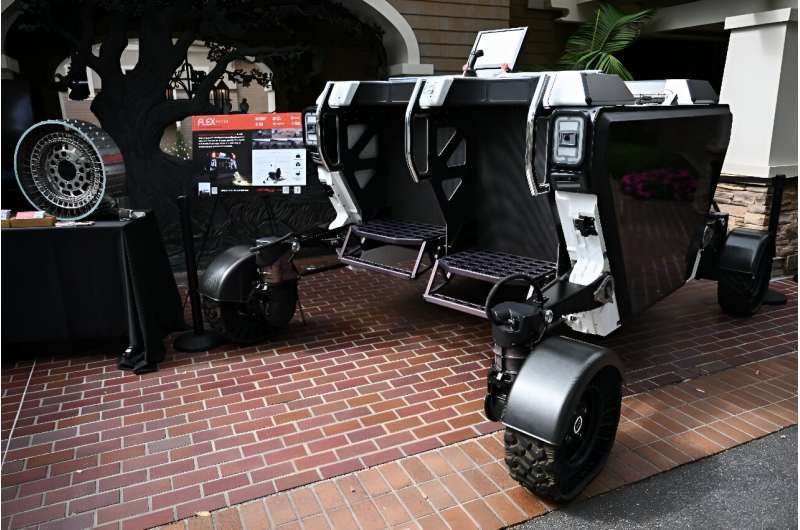This article has been reviewed according to Science X's editorial process and policies. Editors have highlighted the following attributes while ensuring the content's credibility:
fact-checked
reputable news agency
proofread
Three companies in the running for NASA's next moon rover

Three companies are in the running to provide NASA's next moon rover for crewed missions planned later this decade, the space agency said Wednesday.
Texas-based Intuitive Machines—which landed a robot near the lunar south pole in February—Lunar Outpost of Colorado and Venturi Astrolab of California have been tasked with developing designs under a contract with a combined maximum potential value of $4.6 billion.
The US space agency anticipates awarding one of the three companies a "demonstration task order"—meaning a test run for their Lunar Terrain Vehicle (LTV), on the surface of the moon, prior to the arrival of crew for the Artemis 5 mission that is currently set for 2030, according to NASA's latest budget request.
"We are building up the capabilities needed to establish a longer-term exploration and presence of the moon," Jacob Bleacher, NASA's chief exploration scientist told reporters. "I like to imagine the views and the vistas that the LTV will enable us to see from the surface of the moon."
Although the contracts went to relatively new companies, they have partnered with more established players in the aerospace industry. Intuitive Machines said it had been given an initial $30 million to advance its prototype, called the Reusable Autonomous Crewed Exploration Rover (RACER), with teammates including AVL, Boeing, Michelin and Northrop Grumman.
Built to withstand temperature extremes
Astrolab said its contract could be "worth up to $1.9 billion"—though didn't mention what amount it was given initially—for its Flexible Logistics and Exploration (FLEX) rover, which it is building along with Axiom Space and Odyssey Space Research. An initial design of its rover was showcased in 2022.
"The FLEX rover is designed to carry two suited astronauts, support scientific exploration with a robotic arm, perform cargo logistics, and withstand the extreme temperatures at the lunar South Pole," the company said in a statement.
Lunar Outpost is working with Lockheed Martin, General Motors, Goodyear and MDA Space, with the team collectively called "Lunar Dawn," on a Lunar Dawn LTV.
"We're taking cutting edge technology and automotive industry strengths to provide a true off-road vehicle capable of allowing us to live and work on the surface of the moon," said the company's CEO Justin Cyrus. Lunar Outpost is planning to put a mini uncrewed rover on the moon later this year, as part of Intuitive Machines' next lander mission.
NASA said it would be purchasing services from the companies, rather than buying their hardware—a contract model it increasingly favors in order to reduce costs and to stimulate a wider space economy. Eventually, the chosen company could have its own private sector clients, too.
The US is planning to return astronauts to the moon and build a sustained presence there under the Artemis program, named for the sister of Apollo in Greek mythology.
The first crewed mission, Artemis 3, is meant to land in 2026, though it's widely assumed that such a timeline is overly optimistic. China is also planning to send a crew to the moon in 2030, as a new space race heats up.
© 2024 AFP





















